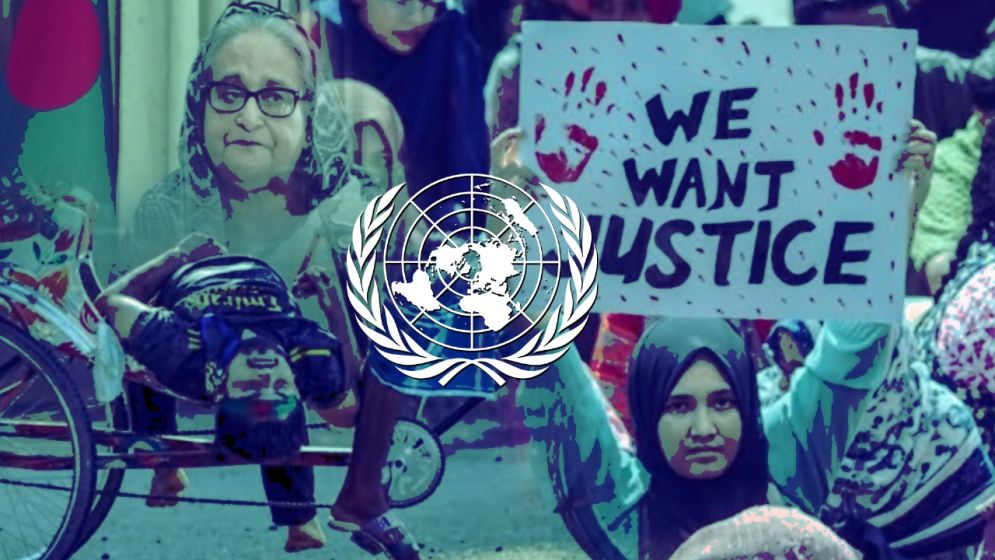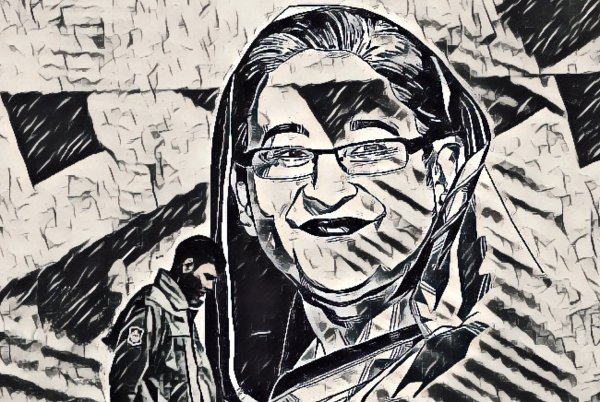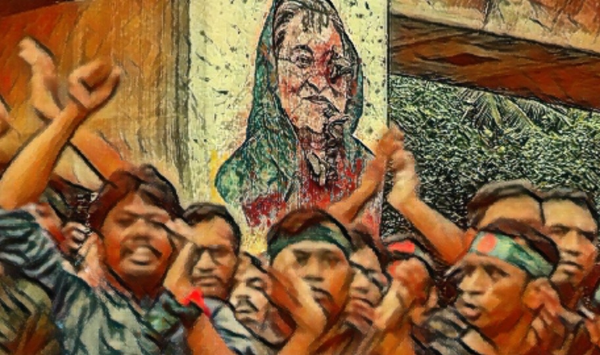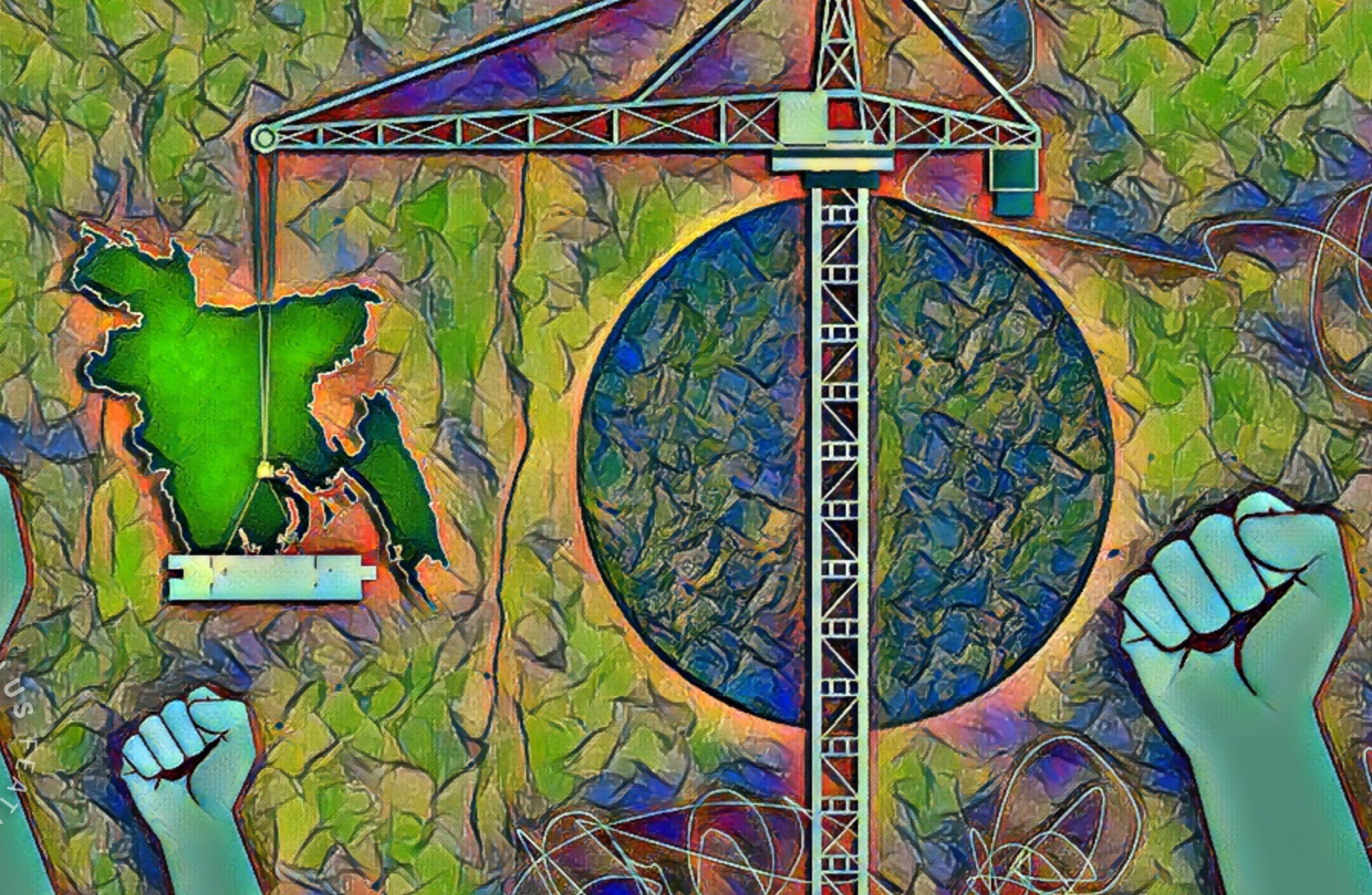UN accuses Hasina regime of committing crimes against humanity during July protests

In a bid to hold onto power, the Awami League government, led by former Prime Minister Sheikh Hasina, unleashed a wave of systematic violence during student-led mass protests in July and August of last year.
According to a report from the United Nations Human Rights Office, this brutal crackdown—carried out with the full backing of the state’s security and intelligence apparatus—may constitute crimes against humanity.
The report, which was made public yesterday, draws on testimonies from senior officials and other evidence to document severe human rights abuses committed by Bangladesh’s security forces.
These violations include extrajudicial killings, widespread use of excessive force that left thousands injured, mass arbitrary arrests, and instances of torture and mistreatment.
The scale and nature of these actions raise grave concerns under international criminal law, prompting calls for further investigations to determine whether the acts amount to crimes against humanity, torture, or serious domestic law violations.
The report estimates that between July 1 and August 15, at least 1,400 people—12% of them children—lost their lives, while over 13,500 others were injured, the overwhelming majority from gunshot wounds inflicted by security forces.
Police also reported 44 of their own officers killed in the unrest.
At a press conference in Geneva, UN High Commissioner for Human Rights Volker Turk declared, "Crimes against humanity have been committed," underscoring the urgency of a deeper criminal investigation into the extent of the violations.
The report further suggests that these acts were carried out with the knowledge and coordination of political leaders and senior security officials, as part of a deliberate strategy to quash dissent.
To compile its findings, the UN mission conducted interviews with 230 witnesses.
At the request of Chief Adviser Mohammed Yunus, the UN Human Rights Office dispatched a fact-finding team to Bangladesh in September to investigate the deadly events surrounding the protests.
The team, which included human rights investigators, a forensic physician, and a weapons expert, was tasked with conducting an independent and impartial inquiry.
The UN reported that the interim government cooperated fully with the investigation, granting access to requested sites and providing substantial documentation to support the inquiry.

Direct order from Hasina
According to former senior officials involved in managing the protests and other inside sources, the former prime minister and senior government figures directly orchestrated a series of large-scale operations, during which security and intelligence forces shot and killed protesters or arbitrarily detained and tortured them.
The report highlights patterns in which security forces deliberately and unlawfully killed or maimed demonstrators, including instances where individuals were shot at point-blank range.
On August 5, one of the deadliest days of the protests, a 12-year-old boy shot by police in Azampur recounted seeing officers firing indiscriminately, describing it as "rainfall."
He noted at least a dozen bodies lying on the ground.
The UN also delved into the case of Abu Sayed, whose dramatic final moments were captured on film as he shouted "shoot me" at police, arms outstretched, during a protest at Begum Rokeya University in Rangpur.
The report concludes there are reasonable grounds to believe that Abu Sayed was the victim of a targeted extrajudicial killing by the police.
Former home minister Asaduzzaman Khan Kamal is said to have used the Border Guard Bangladesh (BGB) as a strike force, even requesting additional helicopters to intimidate protesters, echoing tactics previously employed by the Rapid Action Battalion (RAB).
The report also details instances where security forces blocked or delayed crucial medical care for injured protesters, interrogated patients, and collected their fingerprints in hospitals.
It describes how medical personnel were intimidated, and hospital CCTV footage was seized without proper legal process—actions seemingly aimed at identifying protesters and covering up the full scale of violence committed by state forces.
Additionally, the report highlights disturbing cases of retaliatory killings and other forms of violent retribution targeting Awami League officials and supporters, as well as police and media members, following the July uprising that led to the fall of the Awami League government.

Violations and abuses found by the UN
The report of police and Rab to OHCHR confirmed that rifles with 7.62x39mm ammunition were used by police in Dhaka, Chattogram, Sylhet, Gazipur, Narayanganj, Narsingdi, Kishoreganj, Cox's Bazar, Cumilla, Chandpur, Rajshahi, Chapainawabganj, Bogura, Magura, Bhola, Mymensingh, and by Industrial Police, Armed Police Battalion, and Rab.
"The police, including Dhaka Metropolitan Police, Sylhet Metropolitan Police, Manikganj District Police, and Armed Police Battalion, also used what the police described as submachine guns (SMGs) with a 7.62x39mm calibre.
The report identifies several agencies directly involved in human rights violations, including the Directorate-General of Armed Forces Intelligence (DGFI), National Security Intelligence (NSI), National Telecommunication Monitoring Centre (NTMC), Detective Branch of police, Special Branch of police, and the Counter Terrorism and Transnational Crime unit (CTTC).
These agencies shared intelligence, including surveillance data obtained in violation of privacy rights, which facilitated the mass arbitrary arrests that took place in late July.
The Detective Branch was particularly noted for its routine use of arbitrary detention and torture to extract confessions from detainees.
The CTTC's headquarters also became a site for the arbitrary detention of individuals, including children.
The report also highlights a troubling collaboration between the DB and DGFI in abducting and arbitrarily detaining student leaders, pressuring them to abandon the protests. Furthermore, DGFI, NSI, and DB obstructed life-saving medical care by interrogating patients in hospitals, arresting the injured, and intimidating medical staff.
The NTMC, in coordination with the Bangladesh Telecommunications Regulatory Commission, was implicated in implementing government-ordered internet shutdowns, strategically timed to disrupt communication during the protests.
In addition, DGFI, NSI, and the Rapid Action Battalion (RAB) pressured media outlets to suppress coverage of the protests and their violent suppression.
They also joined forces with the police to intimidate victims, their families, and lawyers, ensuring silence surrounding the abuses.
The fact-finding mission reported that 66 percent of the deaths during the protests were caused by military-grade rifles, with another 12 percent attributed to shotguns loaded with metal pellets.
Security forces deliberately targeted defenseless protesters, shooting at point-blank range, and indiscriminately firing into crowds. The report noted that bystanders, including young children, were often among the victims.
The UN report documents numerous violations during and after the protests, including violence incited by armed Awami League supporters and excessive use of force by police, RAB, BGB, and the military, resulting in extrajudicial killings.
It also details the use of helicopters to intimidate protesters, the obstruction of medical care, and the denial of necessary medical documentation.

Recommendations made by the UN
The UN report outlined a comprehensive set of recommendations aimed at overhauling the security and justice sectors, eliminating repressive laws and institutions that suppress political dissent, and instituting broader reforms in both the political system and economic governance.
Key recommendations include the reform of public order management to focus on de-escalation and the use of non-lethal tactics.
The use of shotgun pellets or other lethal ammunition for crowd control should be prohibited, with an immediate ban on metal pellet ammunition by police.
Outdated laws, such as the Police Act of 1861 and the Police Regulations of Bengal, should be replaced with new, human rights-compliant legislation.
The report also calls for the end of mass criminal charges and arbitrary arrests, as well as the full implementation of the Torture and Custodial Death (Prohibition) Act.
To prevent the use of coerced confessions, reforms should be made to police investigation methods, orders, doctrines, and training.
The Rapid Action Battalion (RAB) should be disbanded, and the roles of the Border Guards Bangladesh (BGB) and Directorate General of Forces Intelligence (DGFI) should be limited to their original purposes.
The demilitarization of Ansar and the Village Defence Party (VDP) is also recommended, and the Army should only be deployed in internal security situations under strict civilian control and in exceptional circumstances.
A national police commission should be established to ensure fairness, transparency, and merit-based processes in police recruitment, promotions, transfers, and dismissals. Independent commissions should be formed to investigate police misconduct, and similar mechanisms should be put in place for the Armed Forces and BGB.
The report stresses the need for a fair and effective criminal justice system to address serious violations and acts of revenge violence.
It also highlights concerns about due process and fair trials in the International Crimes Tribunal.
The introduction of a moratorium on the death penalty, regulation of internet shutdowns with clear criteria and judicial oversight, and the avoidance of political party bans that undermine democracy and disenfranchise voters were also recommended.
Additional measures include protecting journalists, political activists, minority leaders, and human rights defenders, as well as implementing special pre-election measures to ensure free and fair elections, with equal opportunities for all political parties and candidates.
The report further urges action to freeze, seize, and repatriate ill-gotten wealth, with international cooperation, and calls for the strict enforcement of anti-corruption and anti-cartel laws.
The independence and effectiveness of the Anti-Corruption Commission should be enhanced, and workers' rights strengthened through amendments to the Labour Act. Tax reforms should also be introduced to create a more equitable system, while promoting economic diversification for a more resilient economy.
The UN also recommended that Bangladesh refrain from nominating military or police personnel for peacekeeping missions who have served with the RAB, DGFI, or Dhaka Metropolitan Police Detective Branch, or in BGB battalions deployed to the 2024 protests or other similar events, until a human rights screening mechanism is established.
"The best way forward for Bangladesh is to confront the grave injustices committed during this period through a comprehensive process of truth-telling, healing, and accountability, addressing the legacy of serious human rights violations to ensure they never occur again," said Volker Türk, the UN Human Rights chief. "My Office stands ready to assist in this vital process of national accountability and reform."
—-

